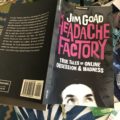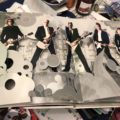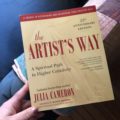Book of the Week (plus side tangents, of course!): John Taylor’s In the Pleasure Groove
So, as mentioned/joked about on the first couple episodes of the new Under My Skin podcast, I recently finished John Taylor’s autobiography In the Pleasure Groove: Love, Death, and Duran Duran.
Well, let’s have a more fair look than I gave it in the podcast, hmm?
(In my defense, the whole point of the podcast is to make obnoxious jokes…)
One thing that’s kinda major, so I’m going to preface all my remarks with it: there’s the matter that this is, of course, ghostwritten, so for any complaint I might have about the book and how JT comes across… is that really him or is that how the ghostwriter and/or publishing house’s editors made him come across?
I’ll also cop to not having known much about Taylor before reading this. I’ve been listening to Duran Duran since I was a little kid listening to my older brother’s rock records, but in terms of the lore of the band, I knew bits and pieces and a lot more about singer Simon Le Bon than about the others in the band, and virtually nothing about Taylor outside of his work, mostly with Duran Duran, of course, but also some of his side projects like The Power Station and Neurotic Outsiders.
I’m guessing the book reads rather differently to his superfans who already knew everything (or think they did) and who read a lot of interviews over the years or who hang out in the band’s fan forum and social media.
With that in mind…
The book is a light read to the point where it often seems rather superficial, then when you have an incident of John kicking the bags of fan mail at his parents’ house or talking about how miserable he was at the end of the ’80s, it comes across as shockingly out of place (for the outbursts) and petulant whining (for the rest). Did he have explanations and/or more in-depth things to say and the editor decided to scrap it all?
Around the same time as I bought In the Pleasure Groove, I also got my hands on a copy of the tour book/program for Red Carpet Massacre in 2008, and in there (towards the back), each member gets a folded-out spread of 4 pages to fill with photos of their own choosing. Simon put pics of his family and friends. Drummer Roger Taylor put pics of old punk show posters and album covers from his collection, things that were obviously huge influences on him. Keyboardist Nick Rhodes put a spread of what looks like static on a video screen or messing around in Photoshop, which makes sense since he does so much graphic and visual work.
John put photos of one of his bookshelves with captions. Tons of books about art, music bios, literature, etc. Including a couple that he captioned “for the literate rocker.”
Clearly, he’s not a stupid or shallow man, and he also talked about how much he loved some book detailing Bowie’s time recording in Berlin, which is very thick and detailed… so… why does In The Pleasure Groove not reflect all this? Why does his own book portray him as rather vapid? Why not give his own book a little more detail?
Again, maybe the publisher thought the Duran Duran fanbase would prefer a shorter and more superficial book rather than one reflecting a “literate rocker.” Maybe there was more depth or nuance and it was chopped… I’ll never know.
Despite these caveats, it was an interesting read, though—as I said before on the podcast and on this blog—it wasn’t really a read that really endeared me to Taylor, at least in large parts of it. Not just for the superficiality of the narrative.
To be fair, perhaps part of what I found maddening/infuriating when reading it is that so much of JT’s apparent personality reminds me of dudes I knew in my time in the music biz.
Y’know, the overgrown boy in a grown man’s body thing. And the combo of drunk reasoning (or the recounting of such) mixed with the whole “nothing’s my fault” vibe post-rehab.
Now, I get why that’s the mantra at rehabs, because self-blame will often lead to relapse and they want to avoid that sort of thing, but it can still be kinda irritating to wade through a lot of absurd/obnoxious behaviour waved away with the magic words.
Although I realize there’s a subtle difference between fault and responsibility. Maybe I’m having a knee-jerk reaction to semantics. There’s a chunk of Mark Manson’s The Subtle Art of Not Giving a Fuck gets into this a bit. Not your fault but your responsibility to act different in the future. Or something like that.
(And again: is that shallow recounting how Taylor actually talks about his addictions? Or was it deemed that anything beyond the surface level of being bored and unsure of what to do with himself in his downtime on the road when not playing being the whole of his reasons for getting wasted all the time wasn’t necessary to the telling of the story? By Taylor or by his writer or by his editor?)
But that’s really to be expected, I suppose, especially when I consider the shit my dumb and irresponsible musician pals got up to without having pop stardom or wealth or millions of girls throwing themselves at them.
Of course, I got up to some of my own dumb shit in the maQLu days, and while I was never anywhere on the level of Duran Duran, lol… I still found some of Taylor’s comments rather familiar.
Especially about the crazy fans… although Taylor loves his fans while I found mine a prime reason to quit the business. (Well, not all of my fans, but a few and that was more than enough.) Granted, it would be rather different for a man dealing with obsessed teen girls versus a woman dealing with unhinged male fans from the industrial scene.
I once had a dude hassle me on Facebook after I was pretty much already done with the biz (though still a couple years before I quietly dumped the final album, Divisive, out onto iTunes and walked). He seemed to think I owed it to him to keep making bad rip-offs of shit Einstürzende Neubauten got bored of making in the mid-80s, even though I was very clear I didn’t wish to do so and had moved on. He argued that I shouldn’t learn to play guitar. And at some point when it was clear I wasn’t listening/complying, he moved clear across the country and sent me a message saying he was now in Vancouver with no idea of where he was going to stay.
I guess in his mind I would invite him to live with me and we’d fall in love or God knows what. Because that’s what every woman wants: a weird dude, who won’t even respect her volition to choose what instrument to play, imposing himself into her living space.
I told him to try Craigslist for a roommate and stopped responding to his shit.
So… you can imagine what I thought while reading Taylor talking about the constant crowd of fans hanging out on his driveway, essentially imprisoning him in his home unless he wanted to walk the gauntlet of signing autographs, taking pictures, etc. etc. just to leave. I wouldn’t say it was as serious as some sort of full-on PTSD flashback, but it was certainly kinda panicky and made my skin crawl.
And while I never got sacks full of fan mail, I could certainly relate to Taylor’s Christmas chimp-out wherein his parents presented him with two giant sacks stuffed with thousands of letters from fans one Christmas Eve when he came home from tour. And then he lost his shit and kicked the bags, etc.
I might not know the sacks of fan mail, but I know that feeling. And also the weirdness of one’s parents turning (or in my case, at least pretending to turn) into fans.
Sometimes you really just don’t wanna hear other people’s takes on your work, even when it’s gushing praise. And sometimes it’s really uncomfortable being put on a pedestal, even when you know they mean well by doing it… when people treat you like some god, it’s flattering but also diminishing. Idols are made to be theoretically more than human but, in practicality, far less than human. A fan interacts with their imagination of you which is based on an object (an LP or CD, a photograph) or a soundwave; they see you at the show but even from 10th row you’re the size of an ant and they might as well be watching you on a screen. And they always want more than you can give them, and they often don’t even know what that is, but will stand there staring at you in expectation.
It messes with your head even at a club band level.
But enough about that shit and my history (and the history of some of my friends, since I saw a lot of weird fan shit they had to deal with as well). Back to the book.
I also found some oddities with the pacing, wherein Taylor takes his time outlining his early life, then it seems half the book is the first few years of Duran Duran, then whoosh (pun intended, for fellow DD fans who know what I’m referencing) he races through the rest of his life up until publication date at an increasing pace and decreasing detail.
My all-time favourite DD album, Liberty, gets essentially a sentence mentioning that it was a flop and a couple pages commenting on how living with then-drummer Sterling Campbell was a mistake. Even the comeback album, Duran Duran (aka The Wedding Album), is more or less glossed over. And the reunion album (ie, when JT came back after having left DD for several years, and the other two Taylors, drummer Roger and guitarist Andy, also rejoined), Astronaut, which is my second favorite DD album, is hardly mentioned at all, even though the story of how they all regrouped ought to be a fairly interesting tale deserving of some telling (and one that’s kinda teased in Nick Rhodes’ foreword to the book, though Nick admits he didn’t actually read this book because at the time he was thinking of doing his own autobiography and didn’t want to end up plagiarizing John’s or whatever, so maybe he didn’t realize John ignores that tale… but the editor should have noticed, lol…). Ditto the other couple albums from the 2000s up til the book was written in 2012.
I would have liked to hear more about all of them.
The pacing issues aren’t as weird as, say, Ayn Rand’s Atlas Shrugged, where the narrative runs 1000 pages and then boom, after the climax there’s 2 pages of semi-wrapping things up in an “everything’s gonna be OK” epilogue that reads like an unfinished outline for the real epilogue she didn’t bother to write, but still: In the Pleasure Groove could have benefited from an extra 20 pages on the last 10 years before the book was written.
Maybe that’s an unintentional nod to something Taylor says in recounting his time around when he went to rehab, that he needed to figure out who he was aside from “John Taylor of Duran Duran” and for a time “John from Duran Duran” was the whole of his self-image… but then one would expect the later albums when he was back in with them would have been fleshed out more.
Or maybe because sales weren’t so hot, John wanted to just skip that shit… but he also kinda skims over The Wedding Album, which had a couple huge hits on it and lead to a huge touring schedule.
Maybe he figured his bandmate/apparent nemesis Andy Taylor covered Astronaut in enough detail in his book Wild Boy.
Speaking of that touring schedule in the early 90s… I can’t help but say the shining moment in this book isn’t John’s, it’s Simon Le Bon’s when he and John have a conversation of how badly JT is coping (or rather not coping) on tour and miraculously a couple hours later the tour manager informs everyone that Simon is suddenly sick and can’t sing for at least a few weeks so everyone can go home to their families.
That took guts for Simon to do, because then as now, a few weeks of cancelled dates usually comes with a financial penalty (though perhaps the booking contracts cover cancellations due to the singer being “sick”), not to mention disappointed fans etc.
Yet another side note: JT mentions that Simon sang “Save a Prayer” at JT’s father’s funeral. Which is something I’ve always wondered: why does Simon tend to perform “Save a Prayer” as a remembrance thing? I remember the tour documentary Sing Blue Silver in the ’80s showing Simon dedicating the same song in memory of Marvin Gaye after his murder. And I saw DD play live a couple days after Frank Zappa died, on the 1993 tour when Zappa’s former guitarist Warren Cuccurullo was in the band and I think Simon dedicated “Save a Prayer” to Frank as well.
Uh… the lyrics are about a one-night stand. I get that the chorus is vague enough to mean anything, but the verses are pretty clearly about screwing some chick. Who seems to be a shy chick, but still: she wasn’t dead (I mean, maybe she laid there like a dead fish as some females apparently do, but that’s not actually the same thing.)
Then, of course, there’s the August 2016 show in Vancouver I saw where Simon had some spiel about “fuck Trump” (and got booed for it by the suburban folks up in the cheap seats! LOL… that was the day Simon Le Bon learned that Abbotsford exists and that they know how to drive into the city… and then there was laughter—and not just from me!—before Simon kinda recovered from his momentary shock and terror and decided clearly we were booing and laughing at Trump, not at him… whatever helps you sleep at night, sugar…) and somehow that also got a dedication of “Save a Prayer” because… who knows… but I think Andy Taylor mentions in his book that Simon did more or less the same thing in Washington DC right after Dubya won another 4 years… and got booed for it with the DC Swamp crowd chanting “FOUR MORE YEARS!!! FOUR MORE YEARS!!!”
These actually make a bit more sense because the song’s about sleeping with a chick, but also “fuck Trump” or “fuck Bush” might be completely different sentiments to fucking a chick, but both are expressed with the same verb at least so there’s a tenuous thematic connection there.
But the funerary and remembrance dedications have always seemed bizarre to me. Especially after he wrote “Ordinary World” which is most definitely a song of remembrance.
Maybe he thinks it insulting or insensitive to dedicate “Ordinary World” for this stuff because the chorus is about moving on i.e. “I will learn to survive”? Dunno, but it’s still more appropriate than “some people call it a one night stand but we can call it paradise”.
But anyway… that’s a thread more for when Simon eventually gets some ghostwriter to whip up a NYT bestselling autobiography of his very own.
Anyway, this has been long enough. ‘Twas an interesting read for all the flaws I found in it, and ’twill be even more interesting when I get around to reading Andy’s book and comparing the two narratives.



